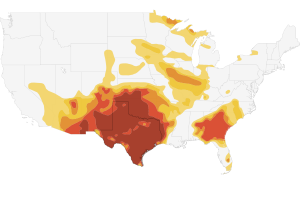Remember sitting at home during February 2 of 2011 as the temperatures dropped and the power kept getting turned off. As millions of Texas sat in the cold and dark Luminant, Texas largest power generator, wasn’t able to get its power plants running along with other generators.
Luminant Energy Company, LLC’s, recently was fined $750,000 as part of a settlement agreement with the Public Utility Commission of Texas stemming from the alleged failure of several Luminant power generating units on February 2, 2011 (when record low temperatures caused a spike in power demand and rolling blackouts were implemented throughout the state).
That February other generation companies saw the cold front coming and got their plants up hot and running keeping this cold snap from being an even bigger disaster than it was.
In ERCOT the state’s power grid operator generation companies are under an obligation to run their power plants and a $750,000 fine in an almost $30 billion dollar market is not much of a fine at all.
Now things are looking dark, gloomy and a bit chilly for EFH Luminants parent company. In November 2013, Energy Future Holdings (EFH) made a decision not to file for bankruptcy saying they believe the company can reach a deal with creditors next spring to avoid a contentious court fight. But with a looming balloon debt payment of $3.8 billion next fall, and a subsidiary of EFH, things are stacking up against the beleaguered Dallas based company.
Electric Reliability Council of Texas (ERCOT) member and Sierra Club Conservation Director, Cyrus Reed weighed in on this development in a statement, saying, “Hopefully, this rather modest fine will send a message to Luminant and other coal and gas generators that when they are paid money by ERCOT to be available in times of emergency — such as the freeze of February 2011 — they must be available. This means utility companies like Luminant must properly maintain their generating units so that breakdowns and emergencies don’t take place when people need electricity the most, such as times of extreme temperatures.”
David Power, Deputy Director of the Texas office of Public Citizen and also an ERCOT member said, “As ERCOT and the PUC consider further changes to ancillary services and potentially to the wholesale energy market, they must make sure that those paid for performance can realistically perform, or face stiff penalties. Texas doesn’t need new, expensive power plants to meet our needs and power our economy, but we do need responsible utilities following the letter of the law and taking responsibility for its assets. What did perform well in both in February and August 2011 was demand response, a method of reducing electricity demand, by large and small industrial and commercial entities. As Texas considers changes to our market we should prioritize resources like demand response that we can depend on.”
For it’s part, a representative of Luminant said in an email to FierceEnergy that “with this settlement, Luminant resolves all alleged violations of ERCOT protocols and PUC rules from the cold weather event in 2011.The agreement represents an amicable settlement of disputed issues in which Luminant admits no violations.”The email continues, “The severe unprecedented cold in February, 2011 was a trying yet learning experience for ERCOT, the PUC, state lawmakers, electric generators and transmission and distribution companies. Some 225 generation resources in ERCOT, more than 40 percent of the total generation, experienced a trip, failed start or derate. Since 2011, Luminant has joined other generators, electric transmission firms and state agencies to take measures to better prepare for future extreme weather.”
But trouble just seems to keep cropping up:
A prior and unrelated Department of Justice Clean Air Act complaint that was recently unsealed alleged that Luminant made major modifications to Units 1, 2, and 3 at their Martin Lake coal plant in 2005, 2006, 2007, 2008, and 2009 and continues to operate the plant without installing pollution controls for sulfur dioxide and nitrogen oxides. The complaint also alleges that Luminant has improperly withheld information from the government requested by EPA under Section 114(a) of the Clean Air Act.
According to the claims, Luminant made “major modifications” at its Big Brown and Martin Lake coal plants that increased sulfur dioxide and nitrogen oxide emissions without updating air pollution permits or installing pollution safeguards. The Clean Air Act requires plants to obtain permits and install modern pollution controls before making modifications that will increase emissions.
In regard to the DOJ lawsuit, Luminant made this statement via email to FierceEnergy: “There’s no change in our position. We firmly believe that we have complied with all requirements of the Clean Air Act for the Big Brown and Martin Lake Power Plants and our other generation facilities and look forward to proving this in court.”
The company contends that the complaint has not been unsealed, but appears to be playing a game of semantics, saying, “The DOJ simply filed a version of its complaint with information that we agree can be public.”
This prime example of Texas business just leaves us out in the cold.







